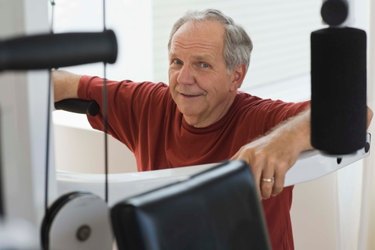
Your age and the heart rate at which you exercise are connected. As you grow older, your resting heart rate slows down. Your maximum heart rate -- the top speed at which your heart pumps during physical activity -- is lower at age 71 than it was when you were 51. To make sure you're exercising within safe parameters, it's helpful to make sure that your heart rate in beats per minute is within what fitness experts call your "target zone."
Defining Your Max
Video of the Day
Calculating your maximum heart rate, or MHR, defers to a specific formula: your age subtracted from the number 220. For example, if you're 71, your MHR is 149. However, your MHR isn't always a concrete number. According to the Cleveland Clinic, certain medications used to treat high blood pressure, diabetes or heart disease can affect your MHR. If you take medications, talk to your doctor first to see if they affect your MHR. If they do, your treating physician or a fitness expert can tell you how to adjust your fitness program accordingly.
Video of the Day
Target Heart Rate
You'll get the best health benefits from your exercise program when you work out at a specific intensity. According to the Cleveland Clinic, this is between 60 and 80 percent of your MHR, although in some cases, it may be only 50 percent of your MHR. The American Council on Exercise takes a slightly more conservative approach, recommending that you exercise at between 50 and 80 percent of your MHR -- beginners in particular may benefit from starting out at the lower end of this range. Using the 50 to 80 percent range, a 71-year-old person's target heart rate should be anywhere between 75 and 119. A heart rate of more than 130 bpm suggests that you may be exercising too vigorously -- at 90 percent of your MHR or even more.
Working Within Your Target
The Cleveland Clinic advises you to avoid working out at 85 percent of your MHR or above. Not only do you not get the added benefits you might think; exercising at such a high intensity makes cardiovascular and orthopedic complications more likely. A heart rate monitor can help you make sure you stay within your target heart rate, as can simply checking your pulse for 10 seconds and multiplying it by six. However, don't rely on heart rate alone. ACE strongly suggests paying attention to what your body is telling you. Your breaths should be deeper and more rapid, but you shouldn't have to gasp for air. You should also be able to speak in simple sentences for 20 to 30 seconds at a time.
Other Tips
Exercise can be a benefit to your health, no matter what your age. The AARP says that if you take a brisk walk three times a week for a year, you may even stave off Alzheimer's disease and other memory problems associated with the aging process. However, if you're in your golden years and especially if you have a health condition that may make physical activity risky to your health, make sure to get your doctor's consent before you start a new exercise program.
- American Association of Retired Persons: Keep Your Memory Strong by Walking
- Mayo Clinic: Exercise -- When to Check with Your Doctor First
- American Council on Exercise: Heart Rate Zone Calculator
- Cleveland Clinic: Exercise and Weight Control
- American Council on Exercise: Monitoring Exercise Intensity Using Heart Rate
- Cleveland Clinic: Pulse and Target Heart Rate